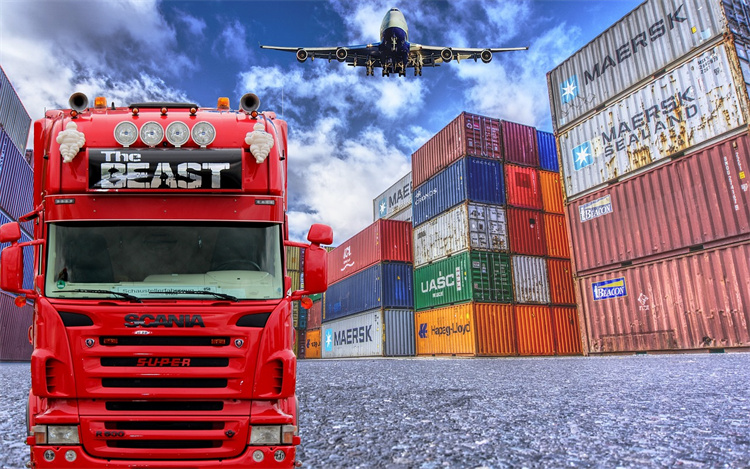Policy Changes and Supply Chain Crises: Survival and Development Strategies for Cross-Border E-Commerce in 2025

Cross-border e-commerce businesses face unprecedented challenges in 2025. Political instability disrupts supply chains, reducing product availability and forcing companies to rethink their strategies. Financial market volatility complicates payment processing and currency exchange, directly impacting profitability. Recent policy changes, such as the suspension of duty-free treatment for shipments under $800 and additional tariffs, demand immediate reassessment of fulfillment models.
Despite these hurdles, the global cross-border e-commerce market continues to grow, projected to surpass $6.72 trillion by 2034 with a compound annual growth rate exceeding 20%. Businesses must embrace resilience and innovation to navigate these supply chain crises and thrive in this evolving landscape.
Challenges Facing Cross-Border E-Commerce in 2025

Policy Changes Reshaping the Landscape
Stricter trade regulations and compliance requirements
Governments worldwide have tightened trade regulations, creating significant challenges for cross-border e-commerce businesses. Companies now face increased scrutiny over product origins, certifications, and environmental compliance. These requirements demand meticulous documentation, raising operational costs and slowing down supply chain processes. Businesses must also navigate varying regional standards, which complicates global operations and increases the risk of non-compliance penalties.
Changes to tariffs and the De Minimis Rule
Recent tariff adjustments have disrupted established trade patterns.
A 25% blanket tariff on Canadian and Mexican imports has increased costs for businesses relying on these markets.
Chinese imports now face an additional 10% tariff, with some goods experiencing combined tariffs of up to 35%.
The elimination of duty drawbacks under new tariffs has further escalated expenses for re-export operations.
Additionally, the suspension of duty-free treatment for shipments under $800 has forced businesses to restructure their fulfillment models. The removal of de minimis benefits has particularly impacted e-commerce sellers, who now face higher costs and reduced competitiveness.
Evolving international tax laws and their impact on pricing
International tax laws have become more complex, directly affecting pricing strategies. The introduction of digital service taxes in multiple countries has increased the financial burden on e-commerce platforms. Businesses must now account for these taxes when setting prices, which can deter customers and reduce profit margins. Compliance with these laws requires advanced tax management systems, adding another layer of complexity to operations.
Supply Chain Crises and Their Implications
Global shipping delays and rising transportation costs
Global supply chain crises have intensified due to worsening port congestion and shipping container shortages. Major trading hubs in China, the U.S., and Europe face significant delays, disrupting delivery timelines. Rising transportation costs, driven by surging freight rates and security surcharges of up to $2,700 per container, have further strained businesses. The reliance on just-in-time manufacturing has left inventories vulnerable, exacerbating these challenges.
Raw material shortages and production bottlenecks
Raw material shortages have become a critical issue, particularly in industries like electronics and automotive. Factory closures during the COVID-19 pandemic disrupted production schedules, creating bottlenecks that persist in 2025. Businesses now struggle to secure essential materials, leading to delays in product availability and increased costs. These shortages force companies to reevaluate their sourcing strategies to ensure supply chain continuity.
Geopolitical tensions disrupting trade routes
Geopolitical tensions remain a significant threat to global trade. Conflicts such as the war in Ukraine and tensions between China and Taiwan have disrupted key trade routes. Rerouting shipping paths to avoid conflict zones has increased transit times and costs. Trade wars and political disputes continue to create uncertainty, compelling businesses to diversify their supply chains to mitigate risks.
Survival Strategies for Cross-Border E-Commerce
Building Supply Chain Resilience with JUSDA
Leveraging JUSDA's global warehouse network for inventory optimization
Supply chain resilience has become a cornerstone of successful cross-border ecommerce strategies. JUSDA's extensive global warehouse network offers businesses the flexibility to optimize inventory management. With over 155 service points worldwide and 2.5 million square meters of warehouse space, JUSDA enables companies to store products closer to key markets. This reduces transit times and mitigates risks associated with supply chain disruption. Advanced inventory systems like JusLink provide real-time tracking, ensuring businesses maintain visibility and control over their stock levels. By leveraging JUSDA's network, ecommerce companies can enhance fulfillment efficiency and prepare for global expansion.

JUSDA Solutions
To provide you with professional solutions and quotations.
Establishing multi-supplier networks to mitigate risks
Diversifying suppliers is critical for building supply chain resilience. JUSDA supports businesses in establishing multi-supplier networks, reducing dependency on single sources. This strategy minimizes the impact of disruptions such as raw material shortages or geopolitical tensions. Companies can also benefit from JUSDA's expertise in logistics and supply chain management, which ensures seamless coordination across multiple suppliers. By adopting this approach, businesses can maintain continuity and safeguard their operations against unforeseen risks.
Leveraging Technology for Operational Continuity
Using AI and blockchain for supply chain transparency
AI and blockchain technologies are revolutionizing logistics and supply chain operations. Blockchain enhances transparency by providing a decentralized ledger accessible to all stakeholders. This improves traceability, reduces fraud, and ensures compliance with regulations. AI-powered tools, such as predictive analytics, help businesses anticipate delays and optimize routes, reducing downtime. For example, real-time IoT sensors can monitor asset conditions during transit, alerting stakeholders to potential issues. These technologies enable ecommerce companies to maintain operational continuity and adapt to challenges with greater flexibility.
Adopting JUSDA's JusLink platform for real-time tracking and collaboration
JUSDA's JusLink platform integrates IoT, cloud computing, and big data to provide real-time tracking and collaboration. Businesses gain visibility into every stage of the supply chain, from procurement to delivery. Predictive insights allow companies to address potential disruptions proactively, ensuring smooth operations. JusLink's continuous documentation capabilities also support compliance with stringent regulations. By adopting this platform, ecommerce companies can enhance their logistics efficiency and maintain continuity in cross-border transactions.
Diversifying Markets and Suppliers
Expanding into less volatile regions with JUSDASR's logistics solutions
Expanding into stable markets is a key ecommerce strategy for mitigating risks. JUSDASR offers specialized logistics solutions that facilitate entry into less volatile regions. With strategically located warehouses and partnerships with major carriers like FedEx and UPS, JUSDASR ensures timely and cost-effective delivery. This approach not only reduces exposure to geopolitical risks but also supports global expansion efforts.
Partnering with local suppliers to reduce dependency on global networks
Partnering with local suppliers strengthens supply chain resilience by reducing reliance on global networks. JUSDA's expertise in regional logistics helps businesses navigate local regulations and streamline operations. This strategy enhances flexibility and ensures continuity during global disruptions. By fostering strong local partnerships, ecommerce companies can achieve sustainable growth and improve fulfillment efficiency.
Development Strategies for Long-Term Growth

Market Localization for Competitive Advantage
Adapting products and services to local consumer preferences
Understanding local markets is essential for cross-border ecommerce businesses aiming to meet consumer expectations. Companies must adapt their products and services to align with regional tastes, cultural nuances, and purchasing behaviors. For instance, tailoring content and user experiences to reflect local languages and traditions fosters stronger connections with customers. Managing logistics and shipping effectively ensures timely delivery, while localized customer support enhances the overall experience. These efforts not only improve customer satisfaction but also establish a competitive edge in diverse markets.
Navigating regional regulations with JUSDA's expertise
Compliance with regional regulations is a critical strategy for long-term growth. Businesses must conduct thorough research into the regulatory landscape of each target region and adjust their operations accordingly. JUSDA's expertise in navigating complex customs policies and trade requirements simplifies this process. By staying updated on regulatory changes and leveraging technology solutions like JusLink, companies can ensure compliance while maintaining supply chain visibility. This proactive approach minimizes disruption and positions businesses for sustainable growth.
Adopting Composable Commerce for Agility
Implementing modular e-commerce platforms for scalability
Composable commerce enables ecommerce businesses to scale operations efficiently. Modular platforms allow companies to adapt to new technologies and market trends without overhauling their systems. This flexibility ensures faster time-to-market for new features and improved customer engagement. For example, seamless API integrations enable businesses to incorporate best-of-breed solutions tailored to specific needs. By adopting this strategy, companies can enhance supply chain resilience and meet evolving consumer expectations.
Integrating third-party tools for seamless operations
Integrating third-party tools into modular platforms streamlines operations and enhances agility. Businesses can customize components to deliver personalized customer experiences while maintaining operational efficiency. This approach reduces the total cost of ownership and ensures scalability during traffic peaks. Composable commerce also supports omnichannel experiences, allowing companies to provide consistent service across various touchpoints. These benefits make it a transformative strategy for cross-border ecommerce businesses.
Enhancing Customer Experience
Offering faster delivery options with JUSDASR's last-mile services
Fast and reliable delivery is a cornerstone of exceptional customer experience. JUSDASR's last-mile services ensure timely delivery by leveraging strategic warehouse locations and partnerships with major carriers like FedEx and UPS. This strategy reduces transit times and enhances supply chain resilience, meeting consumer expectations for speed and reliability. By prioritizing efficient logistics, businesses can build trust and loyalty among their customers.
Personalizing marketing and customer support for global audiences
Personalized marketing improves customer retention by creating tailored experiences that resonate with individual preferences. Data-driven insights help businesses anticipate customer needs, while omnichannel strategies ensure consistency across interactions. Real-time personalization demonstrates a commitment to customer satisfaction, fostering brand loyalty. Incorporating customer feedback into marketing strategies further enhances the experience, ensuring businesses remain aligned with global consumer expectations.
Cross-border e-commerce businesses in 2025 face significant challenges, from evolving regulations to supply chain disruptions. Resilience and adaptability remain critical for overcoming these obstacles. Companies must prioritize supply chain resilience by leveraging JUSDA's global logistics network and advanced tools like JusLink. These solutions enhance visibility, streamline operations, and ensure customer satisfaction.
To thrive, businesses should embrace innovation through AI, blockchain, and sustainable practices. Proactive planning, such as tailoring strategies to local markets and investing in secure payment systems, builds trust and strengthens customer relationships. By adopting these approaches, e-commerce companies can navigate uncertainties and achieve long-term growth.
See Also
Exploring Supplier Connections in Global E-commerce Innovations
Addressing Global Supply Chain Growth Issues Effectively
Embracing Technology: Transforming Supply Chain Management Strategies
Revolutionizing Supply Chain Operations with Cloud Technology
